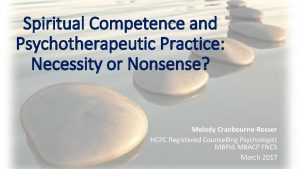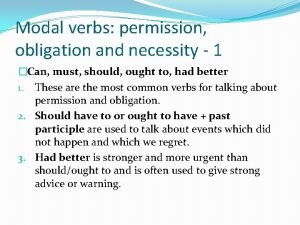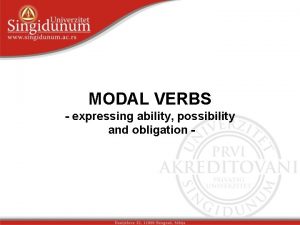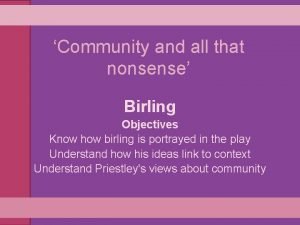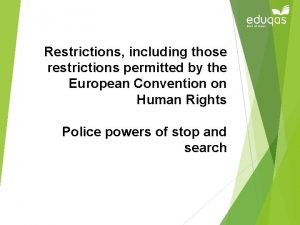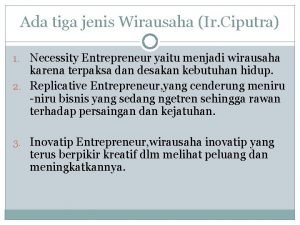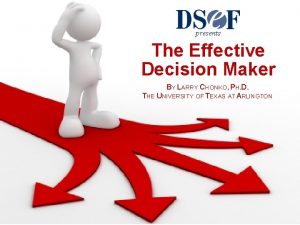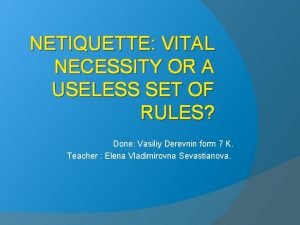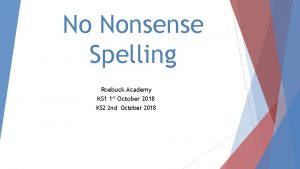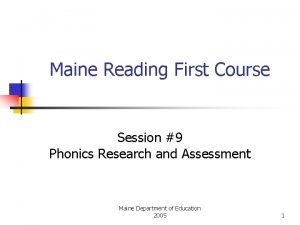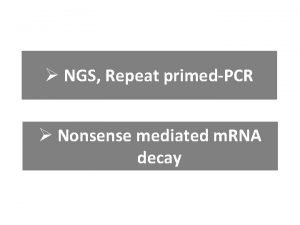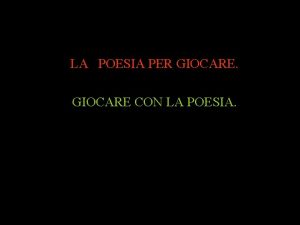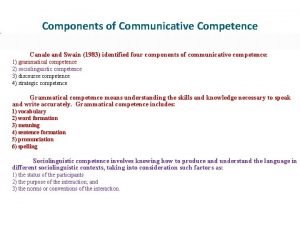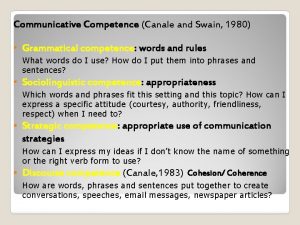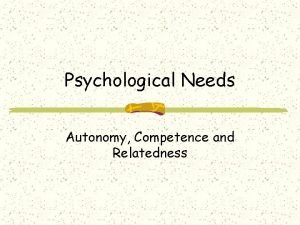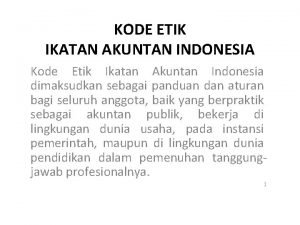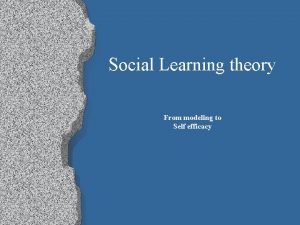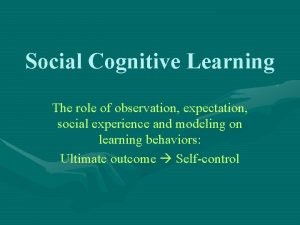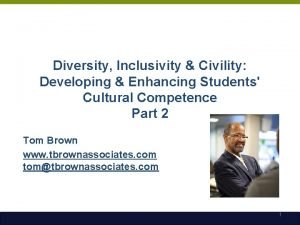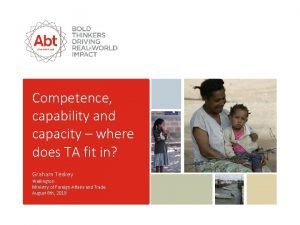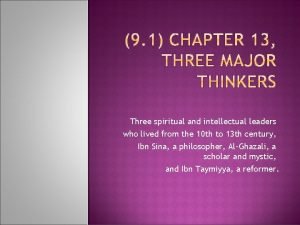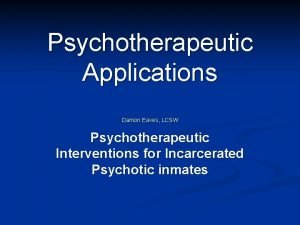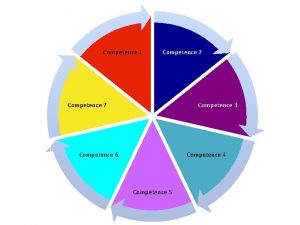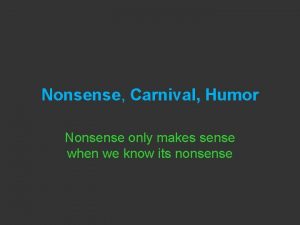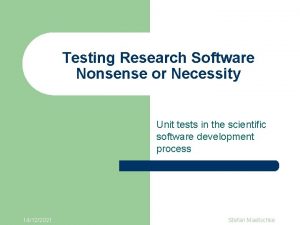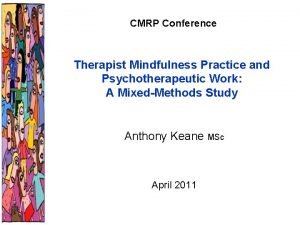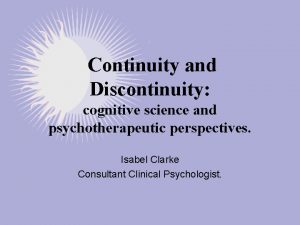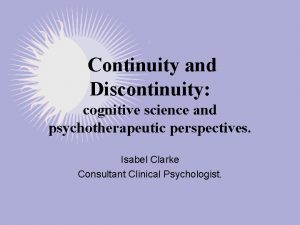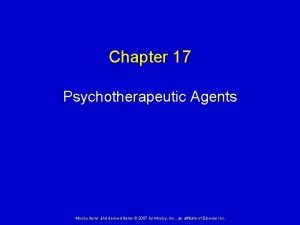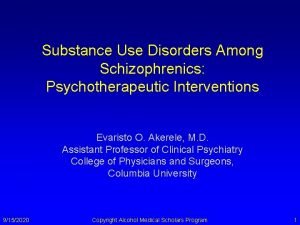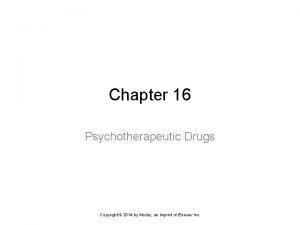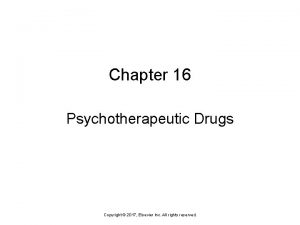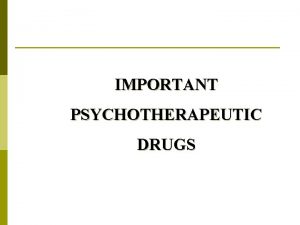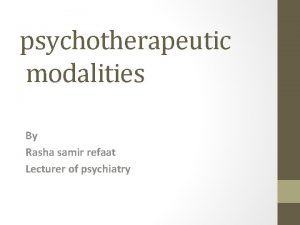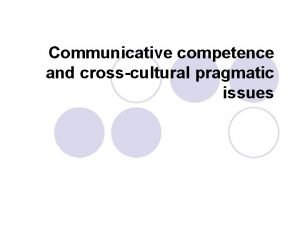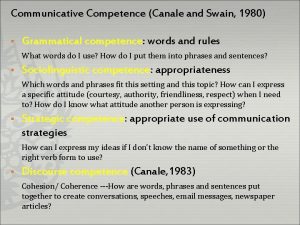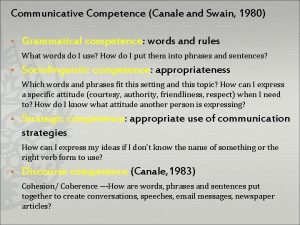Spiritual Competence and Psychotherapeutic Practice Necessity or Nonsense











































- Slides: 43

Spiritual Competence and Psychotherapeutic Practice: Necessity or Nonsense? Melody Cranbourne-Rosser HCPC Registered Counselling Psychologist MBPs. S MBACP FNCS March 2017

Spirituality Spiritual Competence Necessity Nonsense

Defining Spirituality • Subtle / enigmatic nature • Diversity of beliefs / practices • Use terms interchangeably • Wide range of ways of experiencing / expressing v Religious system / framework v Spiritual but not religious v Connection – self / other / natural world v None of the above!

What does the term ‘spirituality’ mean to me?

Spirituality Soul Psychology Transpersonal & Esoteric Psychology Network

Spirituality… • Expresses deepest part of our inner self • Gives our life meaning, purpose and grounding • Highly subjective and personal (but can also be shared) • Source and focus of person’s hope, values and worth • Derive purpose and acceptance • Connecting with ourselves, people, sense of ‘other’ (Adapted from Gilbert and Parkes, 2011)

“Spirituality is… an intra, inter and transpersonal experience that is shaped and directed by the experiences of individuals and of the communities within which they live out their lives. It is intrapersonal in that it refers to the quest for inner connectivity… interpersonal in that it relates to the relationship between people and within communities… [and] transpersonal in so far as it reaches beyond self and others in the transcendent realms of experience that move beyond that which is available at a mundane level” (Swinton, 2001)

2011 Census (Office of National Statistics, 2012) • 68% UK population identify as ‘religious’ • 59. 3% Christian • 4. 8% Muslim • 1. 5% Hindu • 0. 8% Sikh • 0. 5% Jewish • 0. 4% Buddhist • 0. 7% Other (Pagan, Spiritualist, Mixed Religion, Jain, Ravidassia) • Remainder (No religion 25%) (Did not answer 7%)

Spiritual Expression (Adapted from RCPSYCH, 2006, in MHF, 2008) • Belonging to faith tradition • Participating in faith related community-based activities • Ritual and symbolic practices and other forms of worship • Pilgrimage and retreats • Meditation and prayer • Reading scripture • Sacred music (listening, singing, chanting, playing) • Acts of compassion (including work) Deep reflection or contemplation Yoga, Tai Chi and similar practices Engaging with and enjoying nature Contemplative reading (including literature and poetry) • Engaging in creative activities (art, cookery, gardening) • Maintaining stable family relationships and friendships • Group or team sports and recreational activity • •

• Significant / influential aspect of the human experience for many (Swinton and Pattison, 2001; MHF, 2008; Gilbert and Parkes, 2011; West, 2011; ONS, 2012) Spirituality • Research and clinical practice – pros and cons • Neglecting spiritual dimension = Ø Failure to acknowledge whole person Ø Missed opportunities – health enhancing / health declining Ø Unethical?

In what ways might spirituality be important? • Search for meaning, purpose and place • Richness and diversity • Benefits • Caveats • Destination • Journey

Spirituality Spiritual Competence Necessity Nonsense

Competence is… …the ability to do something successfully or efficiently (Oxford Living Dictionary) Is it possible to measure how spiritually ‘successful’ or ‘efficient’ someone is?


Competence is… …the ability to do something successfully or efficiently (Oxford Living Dictionary) Is it possible to measure how spiritually ‘successful’ or ‘efficient’ someone is? Is there a place for spirituality within psychotherapeutic practice… therefore, is it appropriate? As spirituality is complex, personal, subjective… is it feasible?

Spirituality Spiritual Competence Necessity Nonsense

PROFILE Inclusion of Religious and Spiritual Problems (DSM-IV; now 5) Legislations and Guidelines: Standards for Spiritual Care in the NHS in Wales 2010 (WAG), No Health without Mental Health (2011), etc. Support, Information, Training: Spiritual Crisis Network / Spiritual Companions / Spiritual Competence Resource Centre, etc. Spirituality and Psychiatry Special Interest Group Royal College of Psychiatrists Spirituality Special Interest Group Division of Counselling Psychology, British Psychological Society BACP Spirituality British Association for Counselling and Psychotherapy BACP Policy and Position Statements September 2015 Ø Spirituality and Belief

Core Theme or Supplementary Concern? • Legislation, professional guidance, clinical practice – but not always fully or proactively acknowledged in practice “…working under an already intolerable burden of work and responsibilities, spirituality has become a marginalised aspect of care. It may have become more embedded in… rhetoric, but it has not become embedded in… practice” (Clarke, 2013) Spirituality and nursing care but relevant here too!

Spirituality and Mental Health Benefits Concerns • Correlation – mental health, spirituality and recovery (Lukoff et al, 1993; Rohricht et al, 2009; Koenig et al, 2012) • Spirituality can lead to poor mental health – negative beliefs about self / low self-worth due to certain teachings (Gilbert and Parkes, 2011) • 75% studies – role of spirituality • Spiritual but not religious – unable to place experiences in context / positive with regard to wellbeing, draw on religious teachings to make recovery, resilience (Gilbert and sense of these (King et al, 2013) Parks, 2011)

Mental Health and Spiritual Crisis • Concerns raised – pathologising spiritual experiences • Spiritual distress / transformational crisis – unique / holistic response required • Spiritual crisis – intense / sudden / unexpected experiences (e. g. , non-ordinary states of consciousness, experiences with mystical or religious themes) • Individual may be able to work through experience independently but may need support – practitioner / service with understanding of depth and breadth • Challenge – identifying whether spiritual crisis or mental health concern (both? ) Ø Important to consider broader context – social / cultural Ø Resources and services – Spiritual Crisis Network / Spirituality and Psychiatry Special Interest Group (Royal College of Psychiatrists)

Spiritual Abuse • Individuals / small and large group leaders / large organisations • Profound impact on those who are abused • Requires sensitivity / potentially specialist knowledge and experience • Understanding of working with cult survivors - first and second generation

Spiritual abuse is… “… coercion and control of one individual by another in a spiritual context. The target experiences SA as a deeply emotional personal attack… [and] may include manipulation and exploitation, enforced accountability, censorship of decision making, requirements for secrecy and silence, pressure to conform, misuse of scripture or the pulpit to control behaviour, requirement of obedience to the abuser, the suggestion that the abuse has a ‘divine’ position and isolation from others, especially those external to the abusive context. ” (Oakley and Kinmond, 2013)

Contexts continued… Children and young people: • Facilitates search for meaning / coping strategies / support deeper connection to others / promotes sense of self and position in the world / help deal with loss and other life experiences (Walker, 2005; Nye, 2011; Clarke, 2013) End of life: • May “rekindle or intensify spiritual and religious concerns” (Candy et al, 2009) / may reflect on memories, relationships, behaviours, and other such experiences as approach this phase

Keeping in mind potential benefits and concerns, what might happen if spirituality is not taken into account when exploring a person’s wellbeing and needs?

Pathologised Negative or Dismissive Attitude Disregarded Derided

“People who hold religious or other beliefs… have poorer experiences of services because core aspects of their identify are overlooked… [which] may cause anxiety and prove detrimental to their recovery”. (Department of Health, 2011)

Examples from practice… • A client with a terminal diagnosis recounted how a health professional laughed when they said they were following certain practices that they considered spiritual and said, “well, if that’s what you want to do, but its not going to help you of course”. • After the death of a close family member, a client who had been living with bipolar disorder said they were fearful of mentioning their spiritual beliefs, which included life after death, to their psychiatrist as they thought they would see it as part of their illness and increase their medication due to their previous experience of this professional. • A supervisee noted how she felt she couldn’t explore spirituality as an aspect of her practice as her supervisor had questioned its relevance.

“It is difficult to see how psychiatry [or any other aspect of mental health services] can operate effectively and appropriately in a multi-ethnic, multicultural and multifaith society while service user experiences that are lived in cultural, religious and spiritual terms are regarded as ‘pathological’ or ‘delusional’ – and therefore devoid of any meaningful or significant content” (Mind, 2007)

Young and Cashwell (2010) If not explored as part of therapeutic or supervisory process… • ‘Elephant in the room’ • Unconscious influence

Chris Jenkins (in West, 2011) “Because spirituality is at the heart of how people understand themselves in the world, an attack on someone’s spirituality or its denial is an attack on the heart of the person, on their integrity, their wholeness. To refuse to take someone’s spirituality seriously is to refuse to take them seriously. To seek to convince someone that precisely what helps them hold themselves together is ‘immature’, ‘psychotic’, in need of medicating away or has no place in their healing is to do great violence”

Spirituality Spiritual Competence Necessity Nonsense

Protected Characteristic or Crossing Boundaries? • Some might feel that spirituality is a ‘no go’ area in therapy • Many report that it is not included in training or has token coverage • “Suspicious, even hostile, attitude” (Harborne, 2008) • “Arrogant… attitudes towards spirituality and religion” (West, 2011) • But not allowing a space for spirituality is not merely “problematic” it is also “controversial” and negates an important part of who the client is and how they view the world and their place within it (West, 2011)

“For all the rhetoric on training courses about stepping into the clients frame of reference and the use of empathy, many secularly minded therapists struggle with having a positive view” (West, 2011)

• Is spirituality a ‘no go’ area? • Is it similar or different to other protected characteristics? • What might be behind therapists not creating a space for spirituality within therapeutic arena? • What difference, if any, might this have on therapeutic process and relationship?

Spirituality is… “…a concept that is treated with trepidation by mental health practitioners for many different reasons, ranging from fear of overstepping professional boundaries to fear of eliciting false beliefs or because in their practice they have worked with service users for whom it may have genuinely been part for their mental health problem” (Mental Health Foundation, 2008)

Gilbert and Parkes (2011) • Not merely ethical but a legal imperative • When services fail to acknowledge the “animating and life-giving principle” it is like “hitting the target, but missing the point” • Important to engage with the “whole person and whole life situation” • “Spiritual care is humane, ethical and effective”

Essential Competencies (Vieten and Scammell, 2015) Attitudes Knowledge Skills Main Domains

Essential Competencies (Adapted from Vieten and Scammell, 2015) • Empathy & Respect • Appreciation of diversity • Awareness of how beliefs & backgrounds influence practice • Understand different forms of spirituality • Spirituality & religion - overlap / distinct • Taking experiences and differences into account when differentiating between psychopathology and other symptoms • Lifespan changes • Internal & external resources derived from spirituality • Potential for negative & positive impact on health & wellbeing • Legal and ethical issues • Importance of acknowledging spirituality, strengths & resources when exploring clients history • Awareness of recent research developments • Recognition of limitations regarding qualifications and competence – refer where appropriate

BACP POLICY AND POSITION STATEMENTS (SEPTEMBER 2015) a. While there are no universally-agreed definitions of spirituality and religion, both are embedded in society in a broad sense with symbolism and value systems which can provide meaning to everyday life. b. BACP believes that counsellors should respect and be sensitive to the spiritual/religious beliefs, practices and experiences of their clients, or to the absence of them. Spirituality and belief can mean spirituality, belief, faith, religion, or other ways in which an individual may experience and express their deeper connection to and appreciation of self, other and environment. c. BACP’s Ethical Framework acknowledges that one of the fundamental values of counselling and psychotherapy includes a commitment to “appreciating the variety of human experience and culture”, within which spirituality and religion are embedded. BACP recommends that counsellors and supervisors develop specific competences (for example: knowledge, skills and sensitivity) to work with spiritual and religious beliefs, experiences and practices both in therapeutic and supervisory contexts, through training, personal development and/or supervision. d. BACP recognises that some individual/collective religious or spiritual beliefs, no matter how sincerely or devoutly held, do conflict with values and principles held in the Ethical Framework and this requires careful and thoughtful reflection by practitioners when offering counselling or therapy.

Some of what is out there… Brownell, P. (2014) Spiritual Competency in Psychotherapy. USA: Springer Publishing Company. Dailey, S. F. , Robertson, L. A. , and Gill, C. S. (2015) Spiritual Competency Scale: Further Analysis. Measurement and Evaluation in Counseling and Development. Vol 48(1), 15 -29. Saunders, S. M. , Miller, M. L. and Bright, M. M. (2010) Spiritually Conscious Psychological Care. Professional Psychology: Research and Practice. Vol. 41, No. 5. , 355 -362. Vieten, C. , Scammell, S. Pilato, R. , Ammondson, I. , Pargament, K. I. , and Lukoff, D. (2013) Spiritual and Religious Competencies for Psychologists. Psychology of Religion and Spirituality, 2013, Vol. 5, No. 3 129 -144. Vieten, C. and Scammell, S. (2015) Spiritual and Religious Competencies in Clinical Practice: Guidelines for Psychotherapists and Mental Health Professionals. USA: New Harbinger Publications Inc.

Spirituality Spiritual Competence Necessity Nonsense

What does it mean to be a spirituality competent practitioner?

Spiritual Competence and Psychotherapeutic Practice
 Spiritual
Spiritual 1 corinthians 2:9-13
1 corinthians 2:9-13 Modal verbs of obligation and necessity
Modal verbs of obligation and necessity What is the pattern
What is the pattern Ability possibility obligation
Ability possibility obligation And all that nonsense
And all that nonsense Advokate police
Advokate police Necessity of irrigation
Necessity of irrigation Necessity of fuse
Necessity of fuse Jelaskan 3 tipe kewirausahaan menurut ir. ciputra !
Jelaskan 3 tipe kewirausahaan menurut ir. ciputra ! What year did george washington attacks ft necessity
What year did george washington attacks ft necessity Business necessity definition
Business necessity definition False necessity trap
False necessity trap Importance of netiquette
Importance of netiquette Stator resistance starter
Stator resistance starter May can
May can Nonsense poem
Nonsense poem Words without vowels
Words without vowels Scholastic nonsense word test
Scholastic nonsense word test Limerick poem structure
Limerick poem structure Schema aa bb
Schema aa bb Poesia rima alternata
Poesia rima alternata A form of vocal improvisation on nonsense syllables.
A form of vocal improvisation on nonsense syllables. No nonsense phonics pdf
No nonsense phonics pdf Nonsense mediated decay
Nonsense mediated decay Butchwe
Butchwe Issa mood meaning
Issa mood meaning Poem patterns
Poem patterns A load of nonsense
A load of nonsense Haixu tang
Haixu tang Rime baciate esempi
Rime baciate esempi Myeplg
Myeplg Idd training and competence requirements
Idd training and competence requirements Canale and swain's model of communicative competence
Canale and swain's model of communicative competence Canale and swain 1980
Canale and swain 1980 Autonomy competence and relatedness
Autonomy competence and relatedness Bagaimana pencapaian kompetensi seorang akuntan profesional
Bagaimana pencapaian kompetensi seorang akuntan profesional Model prestige and competence
Model prestige and competence Model prestige and competence
Model prestige and competence Understanding civility and cultural competence
Understanding civility and cultural competence Ability vs capability
Ability vs capability U
U The intellectual and spiritual leaders.
The intellectual and spiritual leaders. Nepali cultural and spiritual center
Nepali cultural and spiritual center
